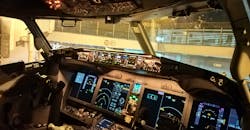New Federal Inquiry Starting of FAA, Boeing
A U.S. Dept. of Transportation Inspector General plans to begin an audit of the Federal Aviation Administration’s history in monitoring and supervising the design and development of the Boeing 737 MAX, according to a DoT memo. Specifically, the audit will focus on FAA’s oversight of the Maneuvering Characteristics Augmentation System (MCAS) and the Angle-of-Attack (AOA) Disagree Indicator; the MCAS is designed to adjust aircraft handling characteristics during manual flight, to compensate for aerodynamic changes resulting from Boeing’s decision to install larger engines on the 737 MAX than were featured on the previous generation aircraft. Post-crash reports cited the MCAS as a contributing factor in both accidents, which has concentrated Boeing’s credibility and FAA’s responsibility during the 737 MAX airworthiness-certification process from 2012 to 2017.
The AOA alert notifies pilots when the two external sensors measuring the aircraft’s angle in the air disagree by more than 10 degrees for at least 10 seconds. In August 2017, Boeing engineers reported that some but not all 737 MAX 8 jets were equipped with an AOA disagree alert, though it was intended to a standard feature. Though this was noted by Boeing in updated certification documents (October 2017), it did not directly notify FAA of the issue.
In February 2019, FAA reviewed Boeing’s decision and agreed that the alert was not necessary for safe operation of the 737 MAX.
The memo details that the audit will begin this month.
The memo also notes that the chairmen of the House Committee on Transportation and Infrastructure (Rep. Peter DeFazio, D-Ore.) and its Subcommittee on Aviation (Rep. Rick Larsen, D-Wash.) requested an evaluation of FAA’s oversight activities related to the Boeing 737 MAX AOA disagree alert, and the inclusion of MCAS in the original design.
The Dept. of Transportation Inspector General previously investigated the roles of FAA and Boeing in the 737 MAX certification process, and in a July 2020 report it found failure on both sides. Later, a Congressional report blamed a series of Boeing design mistakes and FAA oversight failure for the two crashes.
The new audit may further complicate efforts to grant an extension to Boeing for an extension on its compliance with the federal Aircraft Certification, Safety, and Accountability Act taking effect on December 31 – which would require the OEM to retroactively install an Engine Indicating and Crew Alerting System on two as-yet-uncertified variants of the narrow-body series, the 737 MAX 7 and MAX 10.